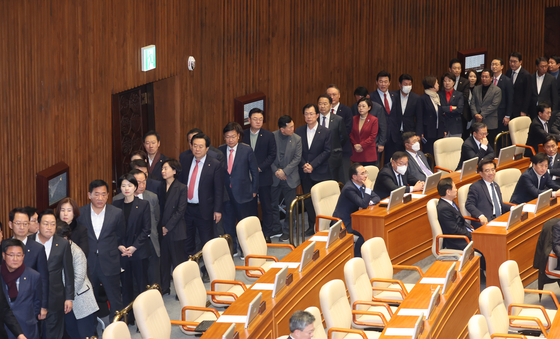The National Assembly voted Saturday to impeach President Yoon Suk Yeol, suspending him from authority following a botched martial law declaration on Dec. 3 that has thrown Korea into political turmoil.
The impeachment motion, passed during a plenary session that started around 4 p.m., was approved through a secret ballot.
Of the National Assembly’s 300 lawmakers, all 300 participated in the vote, with 204 supporting the motion, 85 opposing it, three abstaining and eight votes declared invalid.
While at least eight lawmakers from the president’s conservative People Power Party (PPP), which formally opposed the impeachment, needed to defect and vote in favor for the motion to pass, 12 appear to have broken ranks and joined the 192 lawmakers from the liberal bloc led by the Democratic Party (DP). The defections were enough to push the impeachment motion past the required 200-vote threshold.

Saturday’s motion marks the third impeachment of a sitting president by the National Assembly in Korean history, following the late President Roh Moo-hyun in 2004 and Park Geun-hye in 2016.
The impeachment motion cited Yoon’s violation of the Constitution and laws governing martial law conduct of public officials, as well as the criminal charge of treason for his actions surrounding Dec. 3’s short-lived martial law declaration.
With Yoon’s authority now suspended, Prime Minister Han Duck-soo will step in as acting president in accordance with the Constitution.
The impeachment motion is due to be reviewed by the Constitutional Court, where six out of nine justices need to give their approval for the president’s removal to be finalized. If his impeachment is upheld, Yoon will become the second Korean president to be removed from office during their term, following Park’s ouster in 2017. Roh, in contrast, returned to office after the court rejected the motion.
Yoon’s impeachment comes just 949 days after he assumed office as Korea’s 20th president on May 10, 2022.
His suspension from office marks a stunning reversal of fortunes for a former prosecutor who made his name spearheading the investigation into former President Park and later defying his predecessor Moon Jae-in’s justice ministers, who sought to rein in the powerful state prosecution service he once headed.
Yoon’s impeachment is widely seen by observers to work to the advantage of Rep. Lee Jae-myung, leader of the DP, the largest party in the National Assembly with 170 seats. Lee is considered the liberal camp’s frontrunner for the next presidential election.
According to the Constitution, a presidential vacancy due to impeachment or resignation necessitates a by-election within 60 days. The Constitutional Court has up to 180 days to decide on the motion, but analysts predict a conclusion by March or April next year, based on precedent and the urgency of the situation. In 2017, following Park’s impeachment, the Constitutional Court upheld the motion on March 10 and a presidential election was held on May 9.
After the motion to impeach Yoon passed in the National Assembly, the DP said that the result was a “victory for democracy and the people,” adding that the suspension of authority for Yoon was the “first step” and that the party will “focus all our efforts on the formation of a special prosecution to probe into the martial law declaration of Dec. 3. “The DP also urged the Constitutional Court to “proceed with the impeachment trial as quickly as possible.”
Following Yoon’s suspension from presidential authority, Prime Minister Han will hold an emergency Cabinet meeting at the Seoul Government Complex Saturday evening, where Han plans to review key pending issues of each ministry and urge them to remain steadfast in running the government despite the difficult political situation.
Han is set to deliver a public address later on Saturday.
BY SEO JI-EUN,LIM JEONG-WON [lim.jeongwon@joongang.co.kr]




